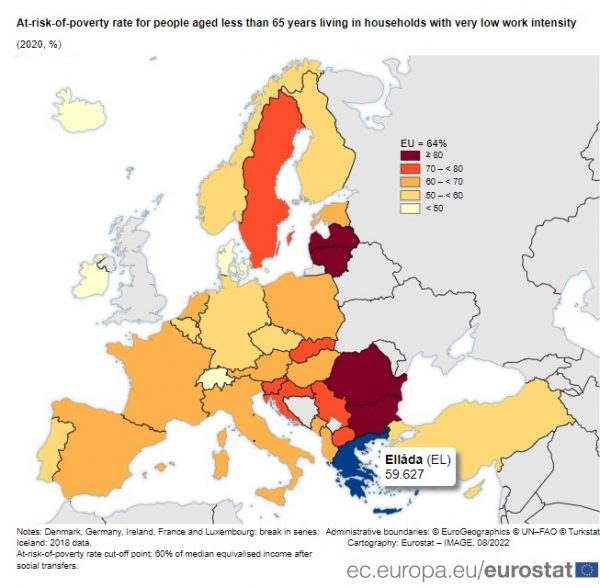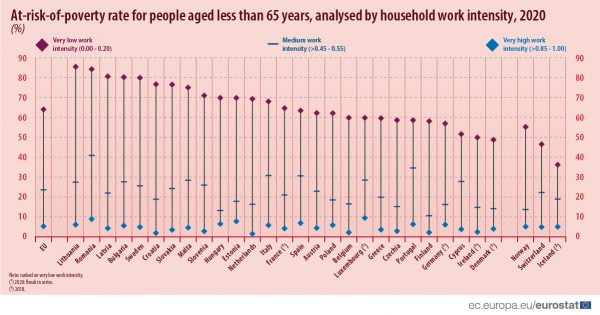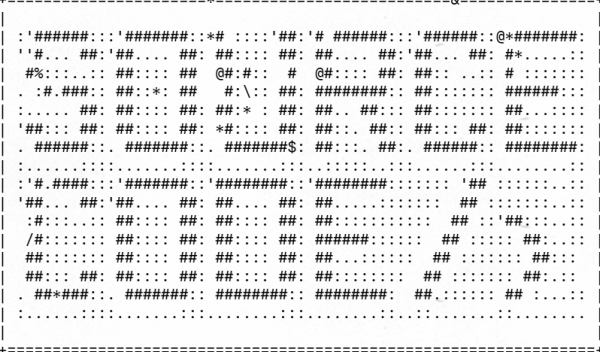
Two out of three households (64%) with very low labor intensity in the EU were at risk of poverty in 2020, while in Greece the corresponding percentage reached 59.6%, according to data published by the European statistical agency, Eurostat.
Work intensity reflects how much all working-age household members have worked compared to their potential. In general, the higher the labor intensity within a household (the closer people are to full-time employment), the less likely it is to be at risk of poverty. Work intensity is divided into three levels, ranging from very low, medium and very high. 
In the EU, the at-risk-of-poverty rate for people aged less than 65 years living in households with very low work intensity was 64.0% in 2020. This rate ranged from 48.7% in Denmark and 49.9% in Ireland to more than 70.0% of the population in nine EU Member States. It reached a peak of 85.4% in Lithuania, followed by Romania (84.2%) and Latvia (80.6%).
2020 data for the EU shows that employment helped prevent people from falling into poverty. The at-risk-of-poverty rate was 64.0% for people aged less than 65 years living in households with very low work intensity as compared to 5.3% for people living in households with very high work intensity, while the percentage for people living in households with medium work intensity was 23.6%. 
Across all EU Member States, a similar pattern was observed, meaning that at risk of poverty decreased as work intensity increased.
Latest News

PM Mitsotakis to Chair New Democracy’s Committee Meeting
Today’s meeting is seen as a crucial opportunity to halt internal disputes within ND and reaffirm unity within the party.

Trump Tariffs Jeopardize Growth: Piraeus Chamber of Commerce
The tariffs, aimed at reducing the U.S. trade deficit, are expected to have both direct and indirect effects on the European economy

EU Condemns Trump Tariffs, Prepares to Retaliate
As tensions escalate, the EU is expected to continue negotiations with Washington while preparing for potential economic retaliation.

The Likely Impact of Trump Tariffs on Europe and Greece
Trump tariffs are expected to negatively affect economic growth in the Eurozone while Greece's exports could take a hit.

Motor Oil Results for 2024: Adjusted EBITDA of 995 mln€; Proposed Dividend of 1.4€ Per Share
Adjusted EBITDA for 2024 was down 33% yoy. The adjusted profit after tax for 2024 stood at 504 million euros, a 43% decrease from the previous year

Cost of Living: Why Greece’s 3% Inflation Is Raising Alarm
Greece appears to be in a more difficult position when it comes to price hikes, just as we enter the era of Trump’s tariffs.

Fitch Ratings Upgrades the Four Greek Systemic Banks
NBG’s upgrade reflects the bank’s ongoing improvements in its credit profile, Fitch notes in its report, including strong profitability, a reduction in non-performing exposures (NPEs), and lower credit losses

Trump to Announce Sweeping New Tariffs Wednesday, Global Retaliation Expected
With Trump's announcement just hours away, markets, businesses, and foreign governments are bracing for the fallout of one of the most aggressive shifts in U.S. trade policy in decades.

Inflation in Greece at 3.1% in March, Eurostat Reports
Average inflation in the eurozone settled at 2.2%, compared to 2.3% in February

Greece’s Unemployment Rate Drops to 8.6% in February
Despite the overall decline, unemployment remains higher among women and young people.
























![ΕΛΣΤΑΤ: Αυξήθηκε η οικοδομική δραστηριότητα κατά 15,6% το Δεκέμβριο [πίνακες]](https://www.ot.gr/wp-content/uploads/2025/03/DSC9655-2-1024x569-1-90x90.jpg)

![Δασμοί Τραμπ: Οι επιπτώσεις στις ελληνικές εξαγωγές και στην ευρωπαϊκή οικονομία [γραφήματα]](https://www.ot.gr/wp-content/uploads/2023/10/ot_exagog_ISRAEL-600x352.png)















 Αριθμός Πιστοποίησης
Αριθμός Πιστοποίησης